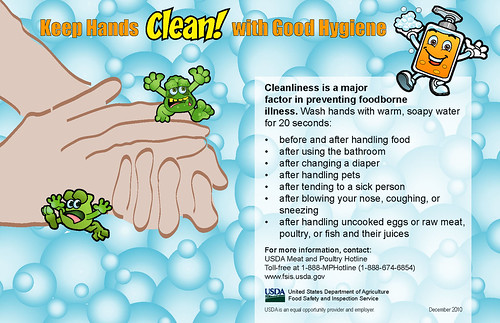
It’s September, which means the kids are back in school. They will be taught reading, writing and arithmetic, but there’s one lesson they might not be getting in the classroom – proper hand washing. This month, Agriculture Secretary Sonny Perdue signed a proclamation (PDF, 346 KB) naming September National Food Safety Education Month. As part of that effort, USDA is encouraging parents, teachers and caregivers to help prevent the spread of foodborne illness (or food poisoning), by using proper handwashing techniques to avoid bringing germs from the playground to the dinner table.
Get your kids in the habit of washing their hands:
- before helping in the kitchen or sitting down to eat a meal
- after handling raw meat, poultry, seafood or eggs
- after touching animals, including household pets
- after using the bathroom
- after blowing their nose, coughing or sneezing
- before and after touching a wound or coming into contact with someone who is sick
You can make proper hand washing a routine by making it fun. Turn hand washing into a party at the sink by getting the whole family involved. Just be sure everyone is following these simple steps:
- Wet your hands with clean, running water (warm or cold), turn off the tap, and apply soap.
- Lather your hands by rubbing them together with the soap. Be sure to lather the backs of your hands, between your fingers and under your nails.
- Scrub your hands for at least 20 seconds. An easy way for kids to learn to time themselves is by singing the happy birthday song twice. Have them sing it to the person whose birthday is coming up next!
- Rinse your hands well under clean, running water.
- Dry your hands using a clean towel or paper towel, or air dry them.
The best way to get your hands clean is using the above method, but if you don’t have access to water, you can use disposable wipes.
Everyone is at risk for foodborne illnesses, but young children are at greater risk for experiencing a more serious illness because their immune systems are not as developed as adults’. As we celebrate National Food Safety Education Month, you can help prevent the spread of foodborne illnesses by making proper hand washing a routine in your home. When you teach your kids these healthy habits, you can help prevent the spread of bacteria and keep them healthy.
For more information about how to make hand washing fun for your kids, visit FightBac.org.
